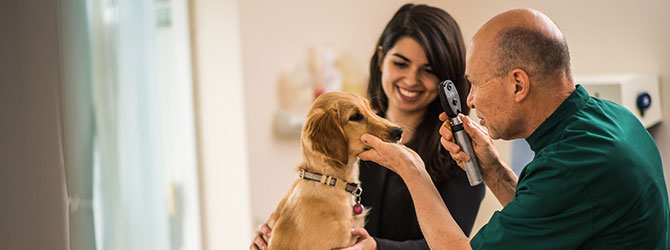Cataracts in dogs
What are cataracts in dogs?
A cataract is an eye condition, namely opacity on the lens that causes blurry vision in humans, dogs and other animals. As cataracts can lead to glaucoma and even blindness over time, it's important they're diagnosed and monitored. But what causes cataracts in dogs – and what can be done for a dog with this condition? We’ve got the lowdown.
What are the causes of cataracts in dogs?
In humans, cataracts are usually a sign of ageing. In dogs, this isn’t always the case. Cataracts can develop as a result of disease – particularly diabetes or inflammation in the eye (uveitis) – old age, injury to the eye, or they can be inherited. It can be helpful to know your dog’s full family medical history, so that you can be alert to any changes to the eyes if he’s at greater risk of developing cataracts.
Common causes of cataracts in dogs
- Diabetes mellitus
- Injury to the eye
- Glaucoma
- Chronic uveitis (inflammation of the eye)
- Lens luxation
- Inherited in some breeds
- Congenital (born with cataracts)
- Low calcium and other nutritional disorders
- Electric shock
- Exposure to radiation or toxic substances
Certain breeds of dogs are more susceptible to cataracts, including:
- Boston, silky and smooth fox terriers
- American cocker spaniels
- Bichon frises
- Golden retriever
- Miniature and standard poodles
- Miniature schnauzers
Read more: Conjunctivitis in dogs
How do I know if my dog is developing cataracts?
Your dog’s eyes are likely to become cloudy-looking or develop a grey-blue tinge as he gets older. This common condition is called nuclear sclerosis. Nuclear sclerosis is caused by normal aging of the lens. It does not affect vision or cause pain. Nuclear sclerosis can look very similar to a cataract. The only way to tell whether your dog is developing cataracts or this common sign of ageing is to get him to your vet for a check-up.
Don’t put off that visit to your vet – cataracts are degenerative, and early diagnosis may be able to stop the progression of the disease.
If your dog has diabetes, other signs he may be developing cataracts include increased thirst, increased urination, and weight loss.
“It can be helpful to know your dog’s full family medical history, so that you can be alert to any changes to the eyes if he’s at greater risk of developing cataracts.”
Read more: How to clean your dog's eyes
How are cataracts in dogs diagnosed?
Your vet will carry out a simple but thorough examination of your dog’s eyes. If they believe cataracts are developing, they will refer you to a veterinary ophthalmologist who can determine the severity of the condition and recommend ways to monitor and manage the problem.
Can I prevent cataracts in my dog?
Cataracts in dogs can’t be prevented, but there are things you can do to take care of your dog’s vision that may help:
- Examine your dog’s eyes regularly
- Take him to your local vet if his eyes begin to look cloudy or grey-blue in colour
- Take your dog to the vet if you notice changes in his vision
- Some experts believe a nutritious diet that’s high in antioxidants can delay or even prevent cataracts
Treatment and cataract surgery for dogs
Developments in modern medicine mean the outlook for dogs with cataracts is positive. Your vet may decide to treat inflammation of the eye with specialist eye drops, but if your dog has already lost his vision due to cataracts, surgery may be an option.
Veterinary ophthalmologists may be able to restore lost vision through surgery, in which they replace the infected lens with an acrylic or plastic lens.
Cataract surgery requires careful post-operative care, but the procedure has a pretty good success rate. Your vet may recommend surgery if he or she believes it can help to restore your dog’s eyesight.
Need more information on cataracts in dogs?
For expert advice on cataracts in dogs, or any aspect of your pet’s health, contact your local vet.
Find your nearest vet using our Find a Vet page, or speak to a vet online using Online Vets.

